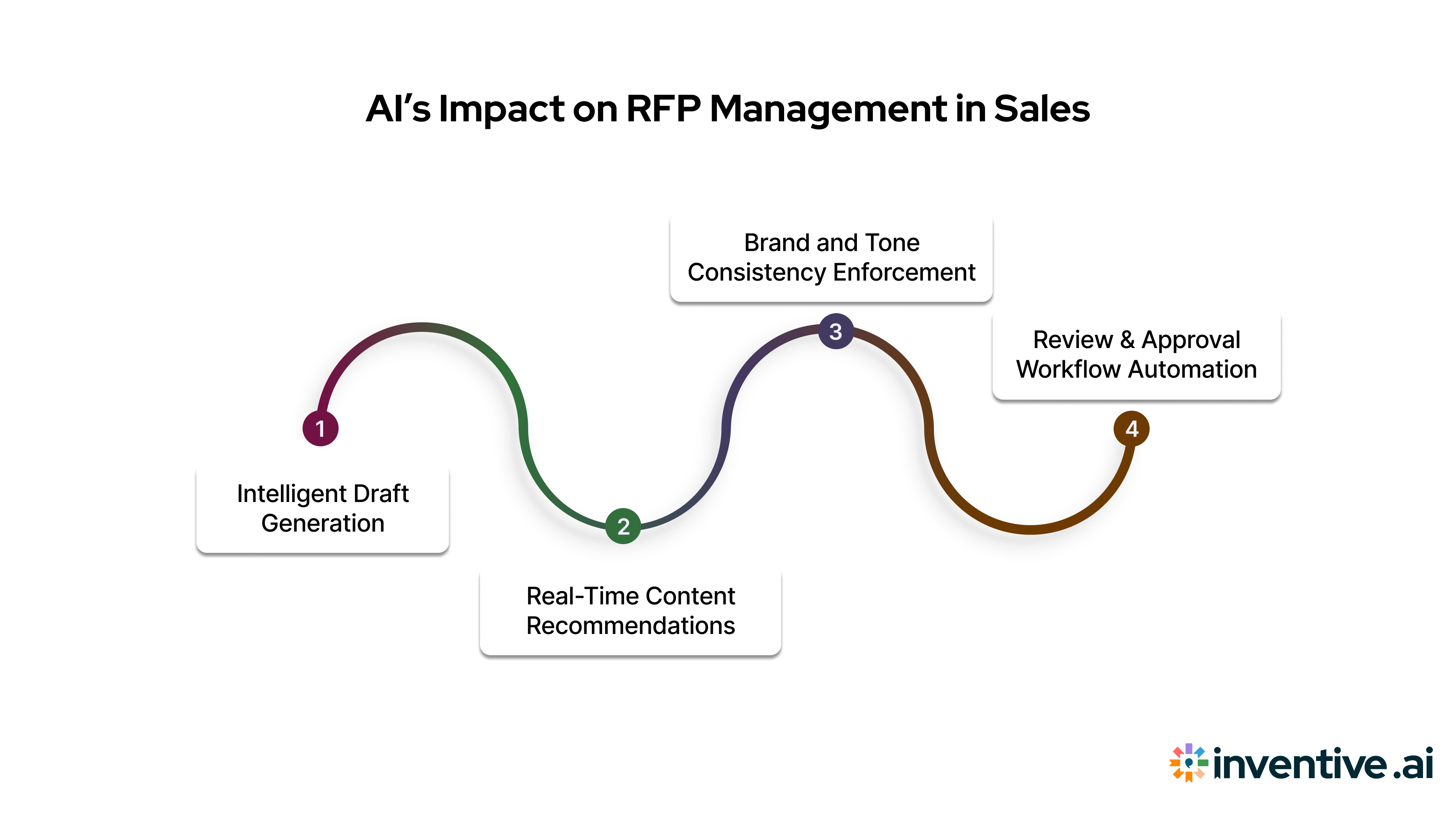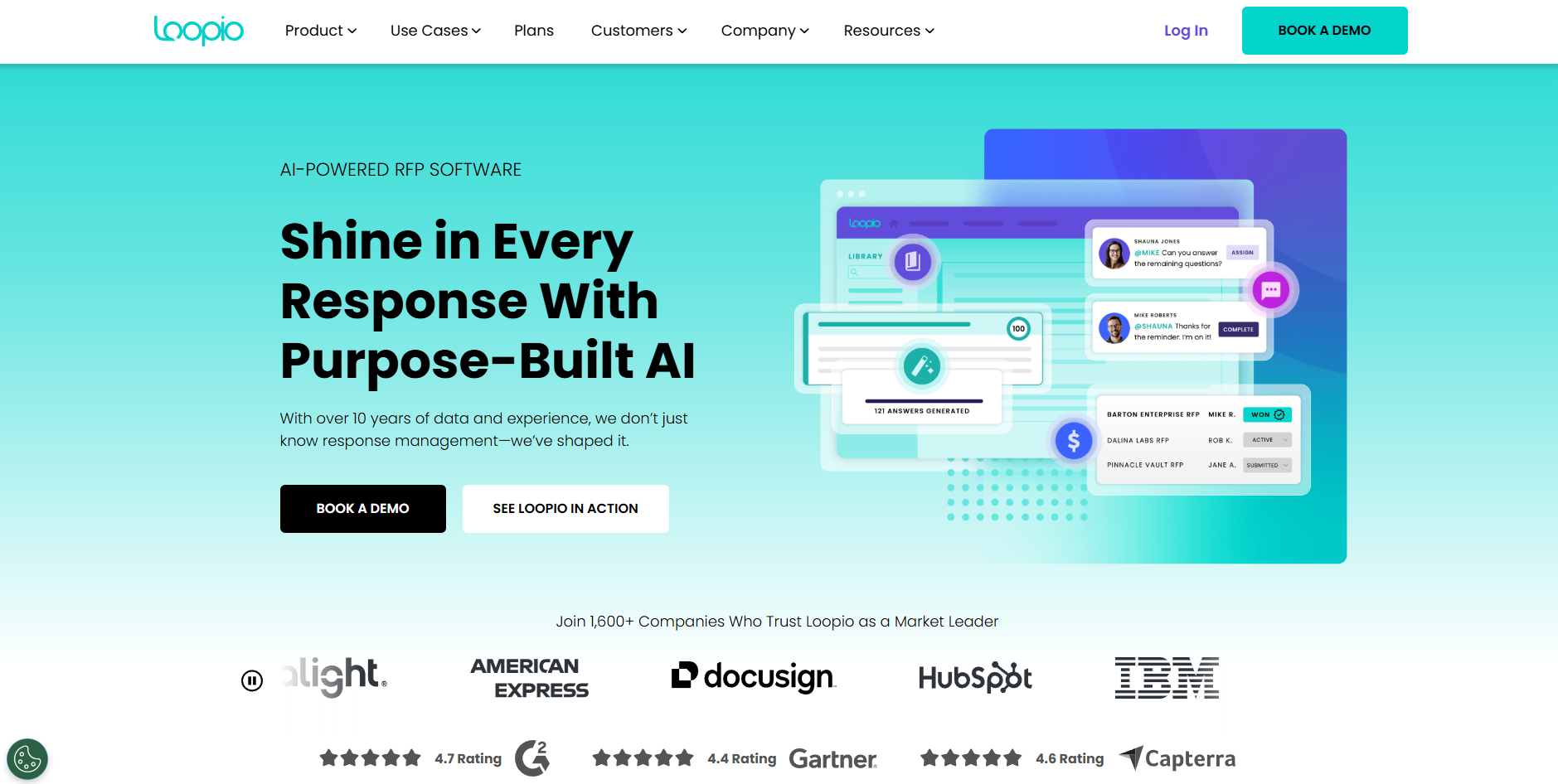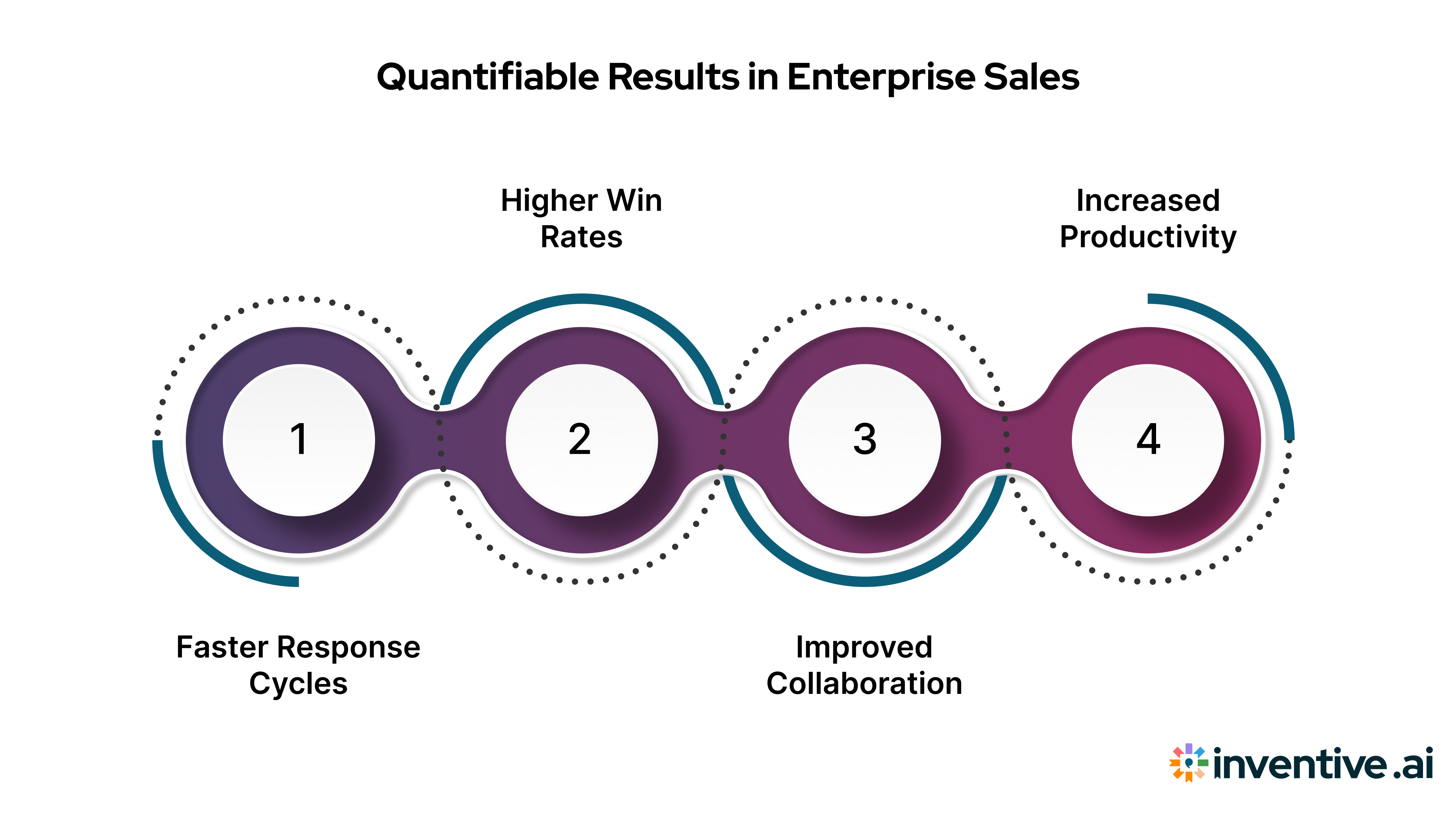Top 5 AI-Driven Tools Transforming Enterprise RFP Workflows in 2026
Enterprise sales teams today operate under immense pressure to deliver precise, on-brand, and timely RFP responses, yet manual workflows continue to be a major bottleneck.

Enterprise sales teams today operate under immense pressure to deliver precise, on-brand, and timely RFP responses, yet manual workflows continue to be a major bottleneck.
According to MarketingProfs, organizations spend an average of 23 hours creating a single RFP response, often involving multiple contributors and review cycles. This inefficiency diverts valuable selling time and leads to slower deal cycles, inconsistent messaging, and missed revenue opportunities.
TL;DR
- AI improves RFP response by automating drafting and content management, reducing response time significantly and speeding up deal cycles.
- Manual workflows limit sales growth, causing fragmented content, inconsistent messaging, and slower approvals that drain selling time and reduce win rates.
- AI-powered RFP platforms revolutionize proposal management, enabling context-aware drafting, improved accuracy, and seamless workflow integration to help teams create consistent, high-quality responses at scale.
- Future-ready AI tools will leverage predictive win analytics, competitive intelligence, and deep CRM–CPQ–CLM integrations to make RFPs part of an intelligent revenue system.
- Organizations adopting AI RFP automation now gain measurable advantages, faster cycles, higher win rates, and more strategic alignment across sales, marketing, and legal teams.
AI-driven RFP automation is changing that. By leveraging intelligent drafting, centralized content hubs, and built-in accuracy controls, enterprise sales teams can now generate compliant, high-quality proposals in minutes instead of days, accelerating deal velocity while maintaining brand precision.
In this article, we’ll explore how AI-driven RFP automation empowers enterprise sales teams to respond faster, improve accuracy, and boost win rates, and how Inventive AI is setting a new benchmark for intelligent, end-to-end RFP management.
Why Managing Enterprise RFPs Remains a Major Sales Challenge
For enterprise sales teams, RFPs are the gateway to high-value deals, often representing multimillion-dollar opportunities that can shape quarterly or even annual revenue. Yet, the process behind these critical documents remains one of the most time-consuming and fragmented parts of the sales cycle.
RFPs can take anywhere from 20 to 40 hours per response, involving input from multiple departments, including sales, legal, finance, and technical teams.
This effort is compounded by scattered content repositories, outdated response libraries, and lengthy internal review cycles that slow progress and introduce inconsistency.
Manual RFP management often leads to:
- Fragmented content: Teams waste time hunting for approved answers across shared drives and email threads.
- Inconsistent messaging: Without centralized oversight, brand tone and accuracy vary from one response to another.
- Slow approvals: Multiple stakeholder reviews delay submission, risking missed deadlines.
- Burnout and inefficiency: Repetitive, low-value tasks drain energy from high-impact selling activities.
For enterprise sales teams, this inefficiency translates directly into lost velocity, lower conversion rates, and ultimately, missed revenue opportunities.
Suggested Read: RFQ and RFP: A Simple Comparison Guide for Better Procurement
How AI Is Transforming RFP Management for Sales

AI-driven RFP management redefines how enterprise sales teams approach complex proposals, transforming manual, repetitive work into an intelligent, streamlined process.
Instead of starting from scratch, teams can now rely on AI to generate context-aware drafts, reuse verified content, and ensure every response aligns with brand standards and buyer expectations.
At its core, AI RFP automation combines contextual understanding, knowledge reuse, and accuracy validation to deliver faster, smarter, and more consistent responses, allowing sales teams to focus on strategy, not formatting.
Intelligent Draft Generation
AI tools automatically generate first drafts based on previous proposals, CRM data, and approved company knowledge. This reduces response time by up to 90%, freeing teams from manual writing and enabling them to focus on refining the win strategy.
Real-Time Content Recommendations
AI suggests the most relevant content and data points from internal repositories, ensuring responses are tailored to each buyer’s requirements and aligned with current offerings.
Brand and Tone Consistency Enforcement
Every response maintains on-brand messaging, tone, and compliance with company standards, eliminating the risk of fragmented communication or off-message submissions.
Review and Approval Workflow Automation
AI automates routing for stakeholder input and approval, reducing bottlenecks and ensuring submissions are both timely and compliant with internal policies.
By embedding these capabilities, AI-driven RFP automation enables sales teams to move from manual content hunting to strategic deal execution, focusing their energy on what truly matters: building relationships, tailoring value propositions, and closing deals faster.
Transforming RFP Responses Through AI Innovation
The traditional RFP process for sales teams is often slow, fragmented, and heavily manual. Teams rely on static templates, scattered documents, and long review cycles, wasting valuable time that could be spent engaging prospects.
AI-driven RFP automation changes this entirely, introducing adaptability, intelligence, and measurable efficiency across every step of the workflow.
From Static Templates → Adaptive, Context-Aware Content
Instead of rigid templates and copy-paste answers, AI dynamically generates responses tailored to each RFP’s context, factoring in industry, buyer intent, and historical performance. This ensures every proposal feels customized, relevant, and persuasive, reducing revisions and increasing win probability.
Outcome: Up to 90% faster response times and fewer clarification rounds.
From Siloed Files → Unified Knowledge Hubs
With AI, all company-approved content, from case studies to technical documentation, lives in a centralized, searchable hub. This eliminates time wasted digging through folders and ensures the most accurate, up-to-date information is always used.
Outcome: Teams reclaim hours per proposal while maintaining 95% content accuracy and message consistency.
From Manual Reviews → Automated Validation and Quality Checks
AI validates responses in real time, detecting inconsistencies, outdated data, or missing sections before submission. Built-in logic ensures every answer aligns with compliance rules, product positioning, and brand tone.
Outcome: Fewer reworks, faster approvals, and higher buyer confidence in your submissions.
By bridging these gaps, AI RFP automation transforms the RFP workflow from a reactive administrative task into a proactive revenue enabler, allowing enterprise sales teams to operate with precision, speed, and confidence in every submission.
Suggested read: The Complete Software RFP Question Bank
Here’s a look at the leading AI-driven platforms streamlining RFP workflows
Top 5 AI-Driven Tools for Managing RFP Workflows in Large Enterprises
Enterprise RFP processes demand speed, accuracy, and alignment across multiple teams, from sales to legal and finance. AI-driven RFP tools are reshaping this space by automating proposal creation, improving compliance, and reducing manual workload.
Comparison Table
Let us take a closer look at them:
1. Inventive AI

Inventive AI redefines RFP automation for enterprise sales and proposal teams. Its AI-Powered RFP Response Software delivers 10× faster first drafts, 95% accuracy, and 0% hallucination, ensuring every proposal is brand-aligned, compliant, and ready for submission.
Built for vendors and sellers, not procurement buyers, it transforms RFP response from a manual process into a competitive advantage.
Key Features & Benefits:
- AI Drafting Engine: Generates complete first drafts from verified company data and past RFPs.
- Centralized Knowledge Hub: Integrates with CRMs (Salesforce, HubSpot), document systems, and past response libraries.
- AI Content Manager: Flags stale or conflicting content, ensuring responses remain accurate and current.
- Collaborative Review Tools: Tracks edits, approvals, and brand-tone consistency in real time.
- Proprietary “Win Themes”: Identifies content gaps and automatically sources relevant insights to boost proposal impact.
Pros:
- Context-aware responses built from verified data
- 10× faster RFP turnaround with 95% accuracy
- Seamless CRM and document integrations
- 50% higher win rate (based on client outcomes)
Cons:
- Initial setup requires content mapping for maximum AI accuracy
- A broad feature set may be onboarding for smaller teams
Pricing:
Custom enterprise pricing available upon request.
Gartner Rating: 5/5
Best For:
Enterprise sales, proposal, and presales teams handling complex, multi-stakeholder RFPs.
2. Loopio

Loopio helps proposal teams manage and reuse past RFP content efficiently. It’s primarily a content management and automation tool designed to handle recurring RFP questions.
Key Features & Benefits:
- Content library with pre-approved answers
- Auto-response suggestions based on stored data
- Integrations with Salesforce, SharePoint, and Slack
Pros:
- Simplifies content reuse
- Reliable for repetitive question sets
- User-friendly interface
Cons:
- Limited true AI capabilities, mainly keyword-based
- Requires frequent manual updates to keep content relevant
- Integrations may need IT involvement for setup
- Slower for large-scale enterprise deployments
Pricing:
Starts around $20,000/year (enterprise tiers vary).
Gartner Rating: 4.4/5
Best For:
Mid-sized organizations with recurring RFP templates and structured question sets.
3. Responsive

Responsive provides workflow automation for large organizations managing multiple, concurrent RFPs. It focuses on intake, project management, and analytics rather than generative AI.
Key Features & Benefits:
- Workflow orchestration across departments
- Auto-suggestion from the content library
- Analytics and dashboarding for RFP performance
Pros:
- Solid collaboration features for large teams
- Good tracking and reporting capabilities
- Handles RFPs, RFIs, and DDQs in one system
Cons:
- Complex interface requiring user training
- Content library maintenance can be time-intensive
- Limited contextual response generation
- Higher implementation costs
Pricing:
Enterprise-level subscription (custom quotes only).
Gartner Rating: 4.3/ 5
Best For:
Enterprises with mature RFP processes require structured workflow management.
For teams needing contextual AI responses and 10× faster drafting, consider Inventive AI.
4. Autorfp AI

AutoRFP ai automates initial draft generation using generative AI models trained on previous responses and company data. It’s suitable for smaller teams prioritizing speed over deep customization.
Key Features & Benefits:
- Quick first-draft creation
- Auto-suggestion from previous responses
- CRM integrations for the sales context
Pros:
- Fast setup and deployment
- Reduces initial drafting time
- Affordable for small-to-medium businesses
Cons:
- Accuracy depends heavily on historical data quality
- Limited customization and control over tone
- Occasional factual inconsistencies
- Minimal collaboration tools
Pricing:
SMB-friendly tiers, custom enterprise pricing available.
Gartner Rating: 5/5
Best For:
Small and mid-size teams needing quick RFP turnaround without complex compliance requirements.
For enterprise-ready precision and fact-checked AI, upgrade to Inventive AI.
5. Arphie

Arphie focuses on collaboration and visibility rather than advanced AI. It simplifies task assignments, approvals, and basic response tracking for smaller proposal teams.
Key Features & Benefits:
- Team collaboration dashboard
- RFP intake and assignment tools
- Simple review and comment workflows
Pros:
- Easy to use with minimal setup
- Clear visibility into team workloads
- Great for managing small-scale RFPs
Cons:
- No deep AI-driven drafting or validation
- Limited integrations
- Lacks analytics and content management
- Not ideal for enterprise complexity
Pricing:
Pricing available upon request.
Gartner Rating: 5/5
Best For:
Small teams managing low-to-medium volume RFPs with basic collaboration needs.
While several tools help automate parts of the RFP process, few truly deliver context-aware, enterprise-grade precision. Most competitors focus on content reuse or workflow coordination, valuable but limited when deal velocity and accuracy are on the line.
Common Pitfalls and How to Avoid Them
Even with strong tools in place, many enterprise sales teams underdeliver on AI RFP automation because of avoidable missteps.
Mistaking Automation for Full Autonomy
AI accelerates drafting and validation, but it doesn’t replace strategic review. Teams that remove human oversight risk subtle tone mismatches or misaligned answers.
How to avoid it: Keep a human-in-the-loop model. Assign reviewers for technical, legal, and pricing sections, and use automated alerts to flag when human validation is needed.
Poor Data Hygiene Leading to Hallucinations or Off-Brand Responses
Unverified or outdated content can cause inaccuracies or “hallucinated” answers. This not only damages credibility but also risks compliance issues.
How to avoid it: Use verified knowledge sources only and schedule monthly content audits.
Tools like Inventive AI’s AI Content Manager automatically flag stale or conflicting information before submission.
Failing to Update Knowledge Bases Regularly
AI models rely on accurate, current data. Outdated case studies, old feature sets, or expired pricing lead to irrelevant or incorrect responses.
How to avoid it: Set a clear content ownership policy. Assign SMEs to update knowledge sections quarterly and track revision dates for each content block.
Weak Cross-Functional Alignment Between Sales, Marketing, and Proposal Teams
Disjointed collaboration leads to fragmented responses, duplicated work, and inconsistent messaging.
How to avoid it: Integrate AI RFP platforms with CRM and collaboration tools like Slack or Microsoft Teams, ensuring real-time visibility. Establish shared goals for response quality and cycle time.
Recognizing these pitfalls early ensures smoother adoption, higher accuracy, and faster ROI.
How Inventive AI Drives RFP Automation for Enterprise Sales Teams
Inventive AI’s AI-Powered RFP Response Software helps enterprise sales teams respond to complex, high-value RFPs faster, without losing accuracy, consistency, or brand voice. Unlike legacy tools, it acts as a true co-pilot, transforming how teams create and deliver winning proposals.
Designed for the Reality of Enterprise Sales
Enterprise RFPs require speed, precision, and cross-team collaboration. Inventive AI streamlines this with contextual automation that ensures accuracy, brand alignment, and complete, compliant responses.
Measurable Outcomes for Enterprise Sales Teams

- Faster Response Cycles: Up to 90% faster drafting and 50% fewer revisions, ensuring you never miss an RFP deadline.
- Higher Win Rates: Teams report up to 50% higher deal acceptance due to faster, more aligned responses.
- Improved Collaboration: Seamless handoffs between sales, technical, and proposal teams reduce friction and errors.
- Increased Productivity: Sales teams reclaim hours otherwise spent on manual editing and formatting, freeing them to focus on strategy and deal execution.
Real Example:
When Insider faced lengthy RFP cycles and scattered content libraries, they turned to Inventive AI to overhaul their response process. Within five days, their team uploaded past proposals and connected existing data to a unified knowledge hub.
The result: What used to take four to five hours now takes just 20–30 minutes per 100-question RFP, a 90% reduction in response time. At the same time, their win rate surged from roughly 30% to 50–70%, demonstrating how faster, sharper responses translate into real sales momentum.
Inventive AI is not just another automation platform; it’s a strategic enabler that transforms RFPs from administrative burdens into competitive differentiators.
Future of AI-Driven RFP Management
The future of AI-driven RFP management is about smarter, more personalized responses that help sales teams work faster and win more deals.
Predictive Win Analytics, Competitive Intelligence & Buyer Personalization
The next generation of AI systems will do more than generate responses; they’ll predict which deals are most winnable based on historical patterns, buyer behavior, and competitive dynamics.
- Predictive win analytics will help sales teams prioritize high-probability RFPs, allocate SME resources efficiently, and focus effort where it matters most.
- Competitive intelligence will enable teams to benchmark their proposals against past wins and market signals, ensuring every response is differentiated and aligned with buyer priorities.
- Automated personalization will tailor tone, language, and value propositions to specific buyers, even mirroring the buyer’s phrasing style to improve resonance and engagement.
Together, these innovations shift RFP responses from static templates to data-informed sales assets.
Deep Integration Across the Enterprise Tech Stack
AI RFP platforms are rapidly converging with the broader revenue technology ecosystem. Integration with CPQ (Configure-Price-Quote), CRM (Customer Relationship Management), CLM (Contract Lifecycle Management), and sales enablement platforms ensures that proposal data flows seamlessly across every stage of the revenue cycle.
This integration enables:
- Real-time pricing and configuration updates pulled from CPQ systems.
- Automatic retrieval of customer context and deal history from CRM.
- Contractually aligned terms and risk flags surfaced through CLM.
- Consistent brand and messaging frameworks drawn from enablement tools.
The result is a truly connected proposal ecosystem, where RFPs become part of a unified, intelligent revenue workflow, from first engagement to contract signing.
Turning RFPs into Strategic Growth Levers
As AI matures, RFPs will evolve from reactive administrative exercises into predictive, proactive growth tools.
Future-ready sales teams will leverage AI to:
- Identify upcoming RFP opportunities before they’re issued.
- Benchmark win themes and buyer pain points automatically.
- Continuously refine messaging through feedback and performance analytics.
In this new paradigm, RFPs will no longer be viewed as time-consuming forms to fill out, but as strategic revenue engines that capture buyer intent, guide product positioning, and accelerate sales velocity.
The future of RFP management is intelligent, predictive, and connected, and enterprise sales teams adopting AI today will lead tomorrow’s competitive landscape.
Suggested Read: RFP Content Library: The Complete Guide to AI Automation
Conclusion
AI is no longer optional; it’s the cornerstone of scalable, consistent, and data-driven enterprise sales operations. As RFPs become more complex and competitive, automating response workflows and maintaining response quality are essential for staying ahead.
Now is the time to evaluate your RFP process, align your AI tools to clear outcomes, and pilot a solution that delivers measurable impact.
Experience how Inventive AI brings unmatched precision, speed, and consistency to every enterprise RFP.
FAQ’s
1. What is AI-driven RFP automation?
AI-driven RFP automation uses artificial intelligence to streamline and accelerate the RFP response process. It automatically drafts accurate responses, retrieves relevant content, and ensures consistency in tone and compliance — reducing manual effort and review time.
2. How does AI RFP automation help enterprise sales teams?
It enables sales teams to generate high-quality proposals faster, maintain consistent messaging, and focus on personalization instead of repetitive drafting. This leads to shorter sales cycles, higher win rates, and improved efficiency across teams.
3. What should enterprises look for in an AI RFP management tool?
Enterprises should prioritize tools that offer AI-powered drafting, centralized content management, strong integrations with CRM and collaboration platforms, and advanced accuracy controls. Scalability, security, and customization options are also key for large organizations managing complex RFP workflows.
4. How can AI improve RFP accuracy and reduce compliance risks?
AI validates responses against approved content sources and company data, minimizing human error. It flags outdated or conflicting information and ensures every proposal meets compliance and branding standards before submission.
5. What measurable outcomes can companies expect from AI-driven RFP automation?
Organizations typically experience significant reductions in response time, fewer manual revisions, and improved proposal accuracy. Many report shorter deal cycles, better collaboration between teams, and higher overall win rates when adopting AI for RFP management.

90% Faster RFPs. 50% More Wins. Watch a 2-Minute Demo.
Tired of watching deal cycles stall due to manual questionnaire back-and-forth, Dhiren co-founded Inventive AI to turn the RFP process from a bottleneck into a revenue accelerator. With a track record of scaling enterprise startups to successful acquisition, he combines strategic sales experience with AI innovation to help revenue teams close deals 10x faster.
Knowing that complex B2B software often gets lost in jargon, Hardi focuses on translating the technical power of Inventive AI into clear, human stories. As a Sr. Content Writer, she turns intricate RFP workflows into practical guides, believing that the best content educates first and earns trust by helping real buyers solve real problems.


